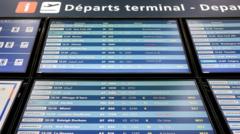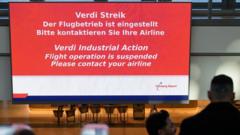The Canadian Union of Public Employees has initiated a strike against Air Canada over unresolved labor issues, prompting government intervention to enforce arbitration and minimize the disruption to travelers.
Air Canada Flight Operations Halt as Union Strike Forces Government Intervention

Air Canada Flight Operations Halt as Union Strike Forces Government Intervention
Air Canada's recent flight cancellations due to a flight attendants' strike thrusts the airline into chaos as the government steps in to mediate.
As Air Canada experiences widespread flight cancellations following a flight attendant strike that started on Saturday, the Canadian government has intervened, urging both parties to return to the negotiating table and pursue binding arbitration. The strike, prompted by the airline's insufficient wage offerings and unfair labor practices, affects numerous passengers and raises concerns over the airline's financial stability.
The conflict escalated rapidly when the union declared a strike after reaching an impasse in contract negotiations with Air Canada. The flight attendants of the Canadian Union of Public Employees (CUPE), representing around 10,000 workers, stated that critical issues including fair wages and compensation for waiting hours remained unaddressed by the airline. Although Air Canada proposed a total compensation increase of 38% over four years, the union deemed the offer insufficient, arguing it fell below inflation rates and market standards, effectively constituting a pay cut.
Following the strike announcement, Air Canada began to ground flights while simultaneously issuing its own lockout notification. This move led to widespread cancellations, and the airline warned that operations would cease entirely without a resolution. Canadian officials, recognizing the potential impact on the economy and travel sector, quickly moved to engage both sides in arbitration, a tactic they have utilized before in similar labor disputes involving Air Canada.
Federal Labour Minister Patty Hajdu announced the government's decision to invoke Section 107 of the Canada Labour Code, compelling both Air Canada and CUPE into binding arbitration to resolve their differences. Despite previous government intervention in negotiations, the airline and the union were unable to come to a resolution independently. CUPE responded to the government's action by denouncing it as a violation of workers' rights, arguing that enforced arbitration could exacerbate ongoing grievances rather than resolve them.
With the uncertainty surrounding the duration of the strike, parallels are drawn to past labor disputes that significantly disrupted Air Canada’s operations. The current intervention by the government illustrates a pattern of interference in labor negotiations aimed at preventing prolonged strikes that could have devastating economic ramifications.
As passengers face significant travel disruptions, Air Canada reassured customers that those with cancelled flights would receive full refunds and alternative travel options through partnering airlines. Yet, many travelers have been cautioned to avoid airports unless they hold tickets with other carriers.
In this complex situation, the impact on Air Canada’s operations and future labor negotiations remains to be fully understood, as both the union and the airline navigate the demands of their respective stakeholders amid this unprecedented strike.






















